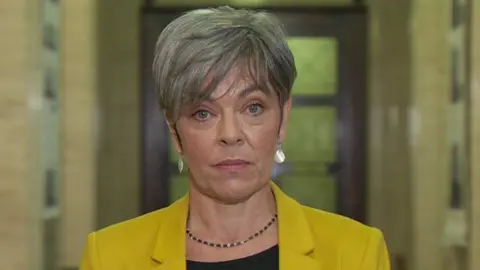Climate change: New law in Northern Ireland aims for net zero by 2050
 Pacemaker
PacemakerNorthern Ireland will soon have its first laws to tackle climate change after MLAs at Stormont passed new, specific legislation.
Agriculture and Environment Minister Edwin Poots had brought the bill.
It will include a target for net zero emissions by 2050 and the appointment of a climate change commissioner.
The Stormont Assembly had been in an unusual position that two pieces of legislation on the same issue were going through the legislative process.
But a separate, more ambitious climate change bill from Green leader Clare Bailey will now not proceed.
Ms Bailey said that as her party and others had amended Mr Poots' bill to make it "stronger than previously proposed", she would not continue to push her bill.
"This has been a democratically developed bill and now is the time we ensure its delivery," she added.
Northern Ireland has been the only part of the UK without climate legislation.
 Getty Images
Getty ImagesMr Poots had originally proposed an 82% reduction in emissions by 2050.
But in February the assembly voted to amend that to a net zero target by the same date, saying it would bring Northern Ireland in line with other parts of the UK.
The bill also now includes legal provision for Just Transition - support for sectors to adjust without being unduly penalised.
And the required reduction in methane, a potent greenhouse gas mostly produced by agriculture, will be limited to 46% under the new laws, following an amendment brought by Mr Poots during an earlier stage of debate.
There had previously been criticism that Northern Ireland had lagged behind Great Britain and the Republic of Ireland on tackling climate change.
The collapse of the Stormont assembly for three years between 2017 and 2020 meant legislation could not proceed.
On Wednesday, Mr Poots hit back at accusations from other parties that he had delayed acting on the issue since becoming agriculture and environment minister in 2020.
"I am pleased my climate change bill has got to this stage... some said I could not or would not bring this forward but it's clear, as I stand here today, those accusations were unfounded," he said.
He argued that Ms Bailey's original bill and some of her proposals were badly drafted and economically damaging.

But Ms Bailey said the assembly needed to play its part in tackling climate change with the "building blocks" which have now been provided.
"It's a good news day and I am delighted that we have something which we can build on now," she said.
She added that the bill, which has now been passed, is not much different from the private members bill she had proposed.
"During the consideration stage, the ministers bill was significantly amended to almost mirror the private members bill," she said.
"There was little point in pushing two nearly identical bills through given the time pressure we were under.
"But we have what we have, which is the foundations and building blocks on which we build."
